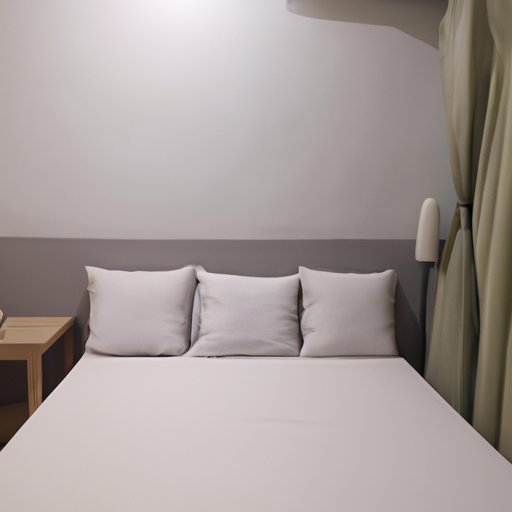Introduction
Fear and anxiety can be difficult to manage at any time of day, but especially at night. It can be hard to relax and get a good night’s sleep when fear and anxiety are present. Fortunately, there are some strategies that can help reduce fear and anxiety at night and make it easier to get a restful night’s sleep.
Definition of Fear and Anxiety
Fear is a feeling of intense apprehension caused by a perceived threat or danger. Anxiety is a feeling of worry or unease about something with an uncertain outcome. Both fear and anxiety can be debilitating and interfere with daily functioning. Everyone experiences fear and anxiety differently, but understanding the root cause of the fear and anxiety can help in finding ways to cope.
Common Causes of Fear and Anxiety at Night
Many people experience fear and anxiety at night due to a variety of reasons. Some common causes include stress, traumatic events, nightmares, health conditions, and medications. It is important to understand the source of fear and anxiety in order to better address it.
Create a Routine
Establishing a calming nighttime routine can be a helpful way to reduce fear and anxiety. A routine helps create structure and gives the mind and body a sense of security. Consider activities like reading, journaling, taking a warm bath, doing yoga, or meditating. Doing the same activities each night will signal to the brain that it is time to relax and prepare for sleep.
Ways to Make the Routine More Relaxing
Making the routine more enjoyable can also help reduce fear and anxiety. Consider adding things like aromatherapy, lighting candles, playing relaxing music, and using essential oils. Adding these elements to the routine can help create a calming atmosphere and make it easier to relax before bed.
Listen to Relaxing Music
Listening to relaxing music can be a great way to distract from fearful thoughts and reduce anxiety. Instrumental music, nature sounds, and songs with a slow tempo can all be helpful in creating a sense of relaxation. Playing this type of music in the background can help soothe the mind and body and allow for a better night’s sleep.

Benefits of Listening to Relaxing Music
Not only does listening to relaxing music help reduce fear and anxiety, but it can also have other benefits. Research has shown that listening to soothing music can improve mood, reduce stress, and increase feelings of well-being. Listening to relaxing music can also help reduce blood pressure and heart rate, leading to a sense of calmness and relaxation.
Exercise
Exercising during the day can help reduce fear and anxiety at night. Regular physical activity increases endorphins, which are hormones that help boost mood and energy levels. Exercise can also help reduce stress and tension, which can lead to a better night’s sleep.

Types of Exercises to Reduce Fear at Night
There are many types of exercises that can help reduce fear and anxiety at night. Walking, jogging, swimming, cycling, and yoga are all great options. It is important to find an activity that you enjoy, as this will make it easier to stick with it. Even just a few minutes of physical activity each day can have a positive impact on fear and anxiety.
Talk to Someone
Talking to someone about fears and worries can be a helpful way to reduce fear and anxiety. Talking to a close friend or family member about what is causing fear and anxiety can help put things into perspective and provide a different perspective. It can also be beneficial to talk to a therapist or counselor who can provide guidance and support in overcoming fear and anxiety.
Who to Talk To About Fears
When looking for someone to talk to about fears, it is important to find someone who is supportive and non-judgmental. Friends and family members can often provide a listening ear and offer helpful advice. If needed, talking to a mental health professional can provide additional support and guidance.
Benefits of Talking Through Fears
Talking through fears can help in a variety of ways. It can help to identify the source of fear and anxiety, as well as provide insight into how to better cope with it. Talking to someone can also provide a sense of comfort and reassurance, which can help reduce fear and anxiety. Additionally, talking to someone can help to reframe fearful thoughts and provide new perspectives.
Make Your Bedroom Comfortable
Creating a comfortable and safe environment in the bedroom can help reduce fear and anxiety at night. This includes making sure the room is clean and clutter free, setting the temperature to a comfortable level, and having adequate lighting. It is also important to minimize distractions, such as televisions, phones, and computers, as these can increase feelings of stress and anxiety.

Ways to Make Your Bedroom Comfortable and Safe
Making the bedroom a place of comfort and safety can help reduce fear and anxiety. This can be done by adding items like blankets, pillows, and scented candles to create a cozy atmosphere. It is also helpful to keep items like a flashlight, a book, or noise makers nearby in case of emergency. Finally, consider adding items like a nightlight or a security system to feel safer in the bedroom.
Conclusion
Fear and anxiety can be difficult to manage, especially at night. However, there are some strategies that can help reduce fear and anxiety. Creating a calming nighttime routine, listening to relaxing music, exercising during the day, talking to someone, and making the bedroom comfortable are all great ways to reduce fear and anxiety at night. With these tips, it is possible to get a better night’s sleep and feel more relaxed.

Summary of Tips to Overcome Fear at Night
The following are tips for reducing fear and anxiety at night:
- Create a calming nighttime routine
- Listen to relaxing music
- Exercise during the day
- Talk to someone about fears and worries
- Make the bedroom comfortable and safe
Final Words of Encouragement
Fear and anxiety can be overwhelming, but with the right strategies, it is possible to reduce fear and anxiety at night. Remember to take things one day at a time and focus on the positive. With patience and practice, it is possible to overcome fear and anxiety and get a good night’s sleep.
(Note: Is this article not meeting your expectations? Do you have knowledge or insights to share? Unlock new opportunities and expand your reach by joining our authors team. Click Registration to join us and share your expertise with our readers.)
